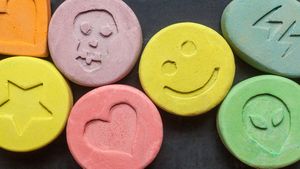MDMA
MDMA, commonly known as ecstasy or Molly, is a synthetic drug that induces both amphetamine-like stimulation and mild hallucinations. MDMA has been shown to enhance fear memory extinction, modulate fear memory reconsolidation (possibly through an oxytocin-dependent mechanism), and bolster social behavior in animal models
Clinical Dosage
Dosage is performed in the following stages...[1]
1. Recruitment and medical screening. Start tapering of other medicines if needed.
2. Prep sessions 1 and spaced over 2 weeks.
3. 3rd preparation session. Finish tapering off medications.
4. 1st MDMA assisted session 80mg + 40 mg booster dose.
5. 3 week break with a 90-minute integration session each week.
6. 2nd MDMA session 80mg or 120mg plus half dose booster.
7. 3 week break with a 90-minute integration session each week.
8. 3rd MDMA session 80mg or 120mg plus half dose booster.
9. Last, 3 week break with a 90-minute integration session each week.
10. Final integration session.
Mechanism of Action
The mechanism of action involves a decrease in activity within the limbic system, a group of structures responsible for emotional responses. Furthermore, there is a reduction in communication between the medial temporal lobe and the medial prefrontal cortex, which play roles in emotional control. Collectively, these effects are contrary to the patterns observed in individuals experiencing anxiety.[2][3]
Effects
MDMA when taken by mouth, effects begin in 30 to 45 minutes and last three to six hours. The medicine provides an experience that is mellower than with other psychedelics, creating feelings of empathy. May enhance fear extinction, resulting in a shift in perspective and improved ability to process traumatic memories. May provide insight into cognition, emotional regulation, and coping strategies. Causes dopamine release that is linked to addictive behaviors.
MDMA can aid sexual relationships
It is likely that MDMA increases sexual desire and intensifies orgasm and that dose, ‘set and setting’, and timing relative to MDMA administration make major differences in ability of men to achieve the erectile quality necessary for ejaculation[4].
MDMA has a stronger effect in women
Women are more affected by MDMA's psychoactive effects than males[5]. Women especially have greater perceptual changes, thought disturbances, and fear of loss of body control. In addition, acute adverse effects and sequelae were also more frequent in female than in male subjects. In contrast, men showed higher increases in blood pressure than women.
MDMA Comedown
There is a wide amount of anecdotal evidence and some scientific evidence[6][7] to suggest that after using MDMA there is an emotional comedown reported colloquially as "Blue Mondays". However, a recent, low powered study found that there was little evidence for this[8].
References
- ↑ MDMA-assisted therapy for moderate to severe PTSD: a randomized, placebo-controlled phase 3 trial, Jennifer M. Mitchell, Published: 14 September 2023, accessed 4 Dec via https://www.nature.com/articles/s41591-023-02565-4
- ↑ 3,4-Methylenedioxymethamphetamine (MDMA) impairs the extinction and reconsolidation of fear memory in rats. Hake, H. S. et al. Physiol. Behav. 199, 343–350 (2019). http://scholar.google.com/scholar_lookup?&title=3%2C4-Methylenedioxymethamphetamine%20%28MDMA%29%20impairs%20the%20extinction%20and%20reconsolidation%20of%20fear%20memory%20in%20rats&journal=Physiol.%20Behav.&doi=10.1016%2Fj.physbeh.2018.12.007&volume=199&pages=343-350&publication_year=2019&author=Hake%2CHS
- ↑ Oxytocin-dependent reopening of a social reward learning critical period with MDMA. Nardou, R. et al. Nature 569, 116–120 (2019). https://doi.org/10.1038%2Fs41586-019-1075-9
- ↑ Does MDMA have treatment potential in sexual dysfunction? A systematic review of outcomes across the female and male sexual response cycles. Wexler A, Dubinskaya A, Suyama J, Komisaruk BR, Anger J, Eilber K.. Sex Med Rev. 2023 Oct 26:qead046. doi: 10.1093/sxmrev/qead046. Epub ahead of print. PMID: 37888490.
- ↑ Gender differences in the subjective effects of MDMA. Psychopharmacology (Berl). Liechti ME, Gamma A, Vollenweider FX. 2001 Mar 1;154(2):161-8. doi: 10.1007/s002130000648. PMID: 11314678. Accessed on 10 May 2023 via: https://pubmed.ncbi.nlm.nih.gov/11314678/
- ↑ Safety pharmacology of acute MDMA administration in healthy subjects. J Psychopharmacol 31: 576–588. Vizeli P, Liechti ME. (2017) Accessed on 20 Nov 2023 via https://pubmed.ncbi.nlm.nih.gov/28443695/
- ↑ Gender differences in the subjective effects of MDMA. Liechti ME, Gamma A, Vollenweider FX. (2001) Psychopharmacology 154: 161–168. Accessed on 20 Nov 2023: https://pubmed.ncbi.nlm.nih.gov/11314678/
- ↑ Debunking the myth of 'Blue Mondays': No evidence of affect drop after taking clinical MDMA. J Psychopharmacol. 2022 Mar;36(3):360-367. doi: 10.1177/02698811211055809. Epub 2021 Dec 13. . Ben Sessa, Jacob S Aday, Steve O'Brien, H Valerie Curran, Fiona Measham, Laurie Higbed, David J Nutt. https://pubmed.ncbi.nlm.nih.gov/34894842/
